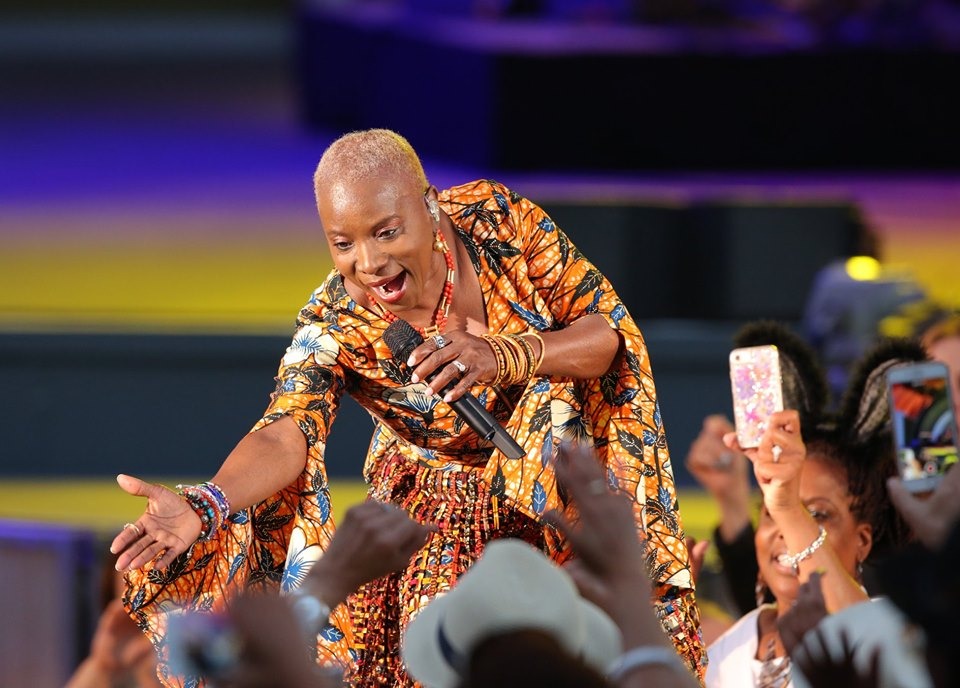Angelique Kidjo is a Beninese singer and songwriter who has become one of the best artists in Africa. She is a model of diversity and her music has elements of traditional and modern African music.
Her captivating voice, commanding presence on stage, and proficiency in different cultures and languages have earned her recognition from her contemporaries and increased her fan base internationally.
Kidjo has infused the West African traditions of her childhood in Benin with elements of R&B, funk, and jazz from the United States as well as Latin and European influences.
Five-time Grammy Award winner has collaborated with a lot of internationally prominent musicians.
Angélique Kidjo was born on July 14, 1960, Ouidah, Dahomey now Benin.
Kidjo was born into a family of performing artists. Her father was a musician, and her mother worked as a choreographer and theatre director.
At age six Kidjo began performing in her mother’s theatre troupe, and, as a teenager, she sang with her brothers in their rock–rhythm-and-blues band. By age 20 she was a professional singer. She recorded her first album, Pretty, in 1988.
In 1983 Kidjo moved to Paris, where she encountered a vibrant musical community and myriad musical styles with which to experiment; in Paris, she also met Jean Hebrail, the French producer, composer, and bassist whom she later married.
Her first years in the city were spent studying jazz and performing with various local groups. After teaming with the Dutch pianist Jasper van ’t Hof, she sang with and co-wrote songs for his jazz group, Pili-Pili.
After several years Kidjo left Pili-Pili and recorded Logozo (1991), which featured the American jazz musician Branford Marsalis and the African artists Manu Dibango and Ray Lema.
With songs addressing issues of global concern such as homelessness, the environment, freedom, and integration Logozo was an international success.
Kidjo increased her international appeal through her later releases, including Fifa (1995), in which she and more than 100 other musicians performed songs in English, Fon (her native language), Yoruba, and French.
Like her earlier releases, Kidjo’s subsequent albums were exercises in musical fusion, melding an array of genres, including jazz, hip-hop, zouk, Zairean rumba, samba, salsa, funk, gospel, Cameroonian makossa, and various Beninese traditions.
Her sixth solo album, Black Ivory Soul (2002), was a dazzling excursion into Brazilian musical forms that deftly blended a Latin sound sensibility with traces of traditional West African rhythms.
Oyaya! (2004) included collaboration with American musician Dave Matthews, and Djin Djin (2007) featured numerous luminaries from the international popular music scene, including Peter Gabriel, Josh Groban, Carlos Santana, and others. Õÿö (2010) was an album of covers, and Spirit Rising (2012) was a collection of live tracks.
Eve (2014), a tribute to African women largely sung in Beninese languages, won a Grammy Award for a best world music album, as did Sings (2015), a collaboration with the Philharmonic Orchestra of Luxembourg.
In 2018 Kidjo covered the Talking Heads album Remain in Light (1980), and the following year she paid homage to Cuban American singer Celia Cruz with Celia. Mother Nature appeared in 2021.
In addition to her recording career, Kidjo was an outspoken advocate of education and health care for women and children. In 2002 UNICEF (United Nations Children’s Fund) named her one of its goodwill ambassadors.
She was elected one of four vice presidents of the International Confederation of Societies of Authors and Composers (Confederation Internationale des Sociétés d’Auteurs et Compositeurs; CISAC) in 2013. Kidjo also released a memoir, Spirit Rising: My Life, My Music (2014).
